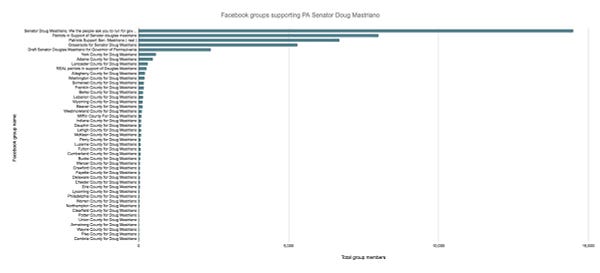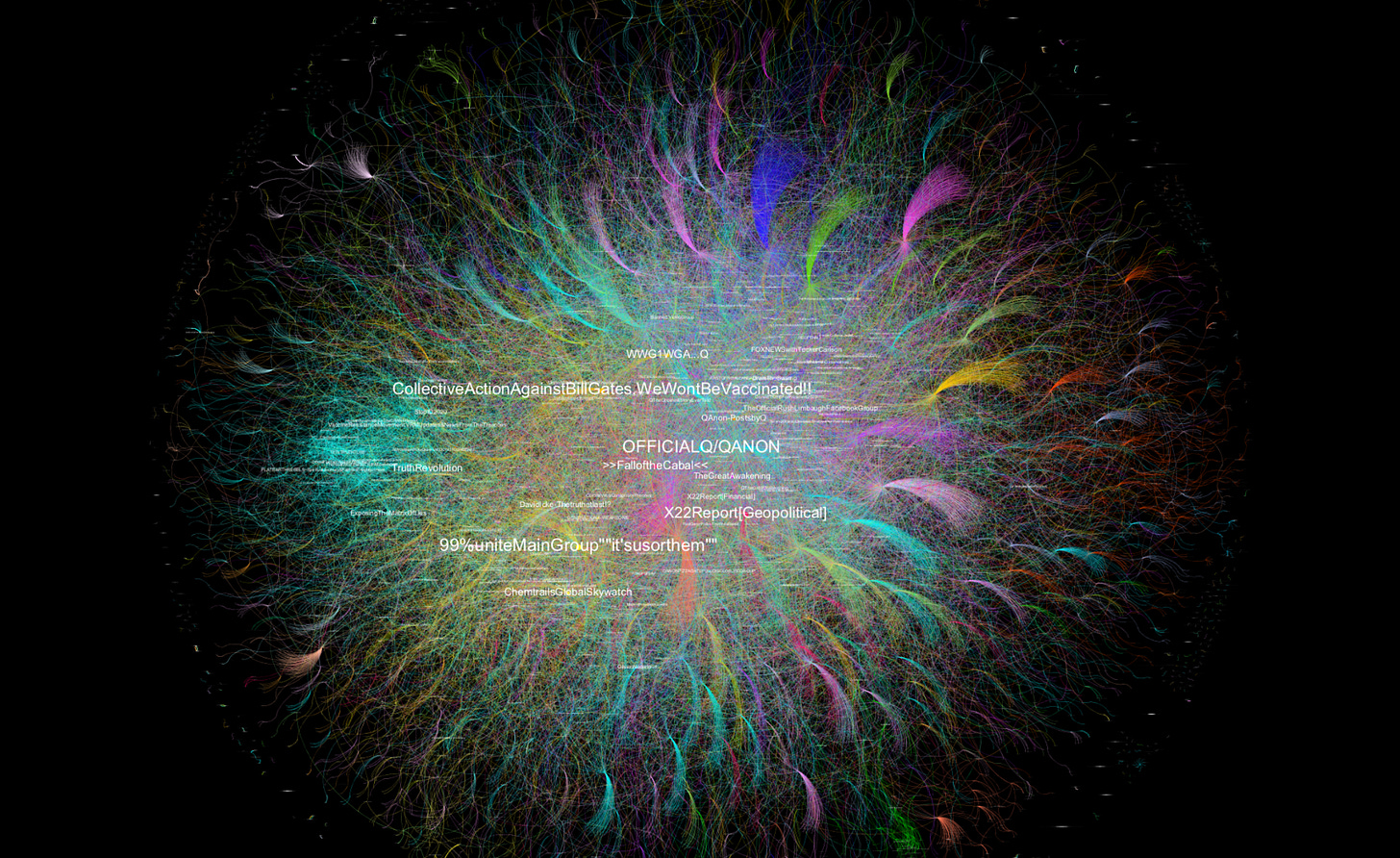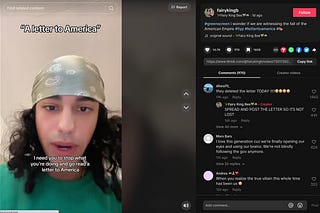

Discover more from Garbage Day
Meet The Researcher Creating Beautiful Maps Of Online Misinformation
"Hardly anything is 100% 'organic' online, but nothing is ever purely fake either."
Welcome to Extra Garbage Day! Every other week, I’ll be dropping a bonus Thursday issue just for paying subscribers. To start, these will be Q&As with interesting people I’ve been dying to interview. Let me know what you think.
In 2018, I was working on a project about Mexican bot farms with a very talented local journalist named Íñigo Arredondo Vera. We spent several weeks tracking down Carlos Merlo, Mexico’s self-proclaimed “king of fake news”. On our team’s the last day of filming we finally managed to secure an interview with Merlo and were able to tour his fake news farm.
It was something of a professional white whale for me. I had always heard about shadowy basements or mysterious Russian office buildings, but I had never been able to actually see one of these places with my own two eyes. The mundanity of the whole thing is something I still think about.
It was a small apartment complex in the outskirts of Mexico City. Merlo had hired a team of 10-15 20-somethings, given them brand new laptops, and told them to basically just sit around all day making memes and creating fake news stories. The operation was so similar to the media companies I had worked for in New York City that I think it actually fundamentally changed the way I thought about my own role in the digital content economy. Is there such a thing as ethical virality on corporate social platforms?
The video Íñigo and I released went pretty viral in Mexico. A few days after it was uploaded, I was stopped outside of an Oxxo mini-mart by a guy who held up his phone and shouted “fake news gringo” at me.
It was around this time that I started talking to Erin Gallagher. She’s something of a rarity — someone with an international focus publishing research in English on non-American misinfo and disinfo. Her speciality is really interesting (and beautiful) visualizations of how internet networks connect. Here’s one she created in May tracking the spread of the Plandemic video.
Gallagher recently started working with the Shorenstein Center’s Technology and Social Change Project and has been publishing some really interesting research about a Facebook network forming in support of Pennsylvania Senator Doug Mastriano.
In our interview below, we talk about what “inauthentic coordinated behavior” actually looks like, why it’s important to not assume that every account you see on the internet is a bot, and what the post-Trump future of online misinformation might look like.
The following has been edited slightly for pacing and clarity.
I've followed you forever, but for new folks, can you tell me a bit about the work you do. I first came across your feed while I was covering election integrity and bot activity in Mexico, I think. Was Central and South America your first main focus area?
TBH I still have trouble describing what exactly I do. I have a degree in Integrative Media which is basically a blend of design and technology. I had planned to be a graphic designer. I used to live in Argentina and am bilingual in Spanish, so I try to follow Latin American news. And for several years did translations of news from the region.
So towards the end of 2014, I was translating news about the Ayotzinapa case in Mexico and that's when I became acquainted with the work of Alberto Escorcia, a Mexican social media analyst. Alberto was creating data visualizations of Twitter networks using an open source software program called Gephi, and trying to show people how these disruptions by bots and trolls were happening around trends related to the Ayotzinapa case. The data visualizations he was creating were so beautiful and I was fascinated by the concept of creating visual representations of digital conversations. So I started reading all of this research from Mexico and just trying to understand what they were doing.
[Ed. note: Escoria helped us with our Mexican bot farm project.]
So I learned Gephi and in 2017 I started a blog on Medium and began publishing my own research. I'm currently working as a research assistant with the Technology and Social Change Project with the Shorenstein Center and published my first media manipulation case study for that project just before the election. And I still do independent research on my own when I have time or if odd things pop up in my orbit.
You and I have talked a lot about this before, but what's the disinfo landscape look like outside of the US? It feels like America is sort of a weird outlier where internet users expect everything they see online to be authentic and genuine, which isn't as true with internet users elsewhere maybe.
The disinformation landscape outside of the US is a dumpster fire. Literally every country that uses social media is struggling to deal with problems like the rapid spread of disinformation online and cyber harassment, or worse... some countries have had multiple public lynchings due to viral rumors. Everything is on fire.
I'm not sure if people in the US are different than folks in other countries when it comes to assessing credibility of information online. I think the tendency to lean towards information that confirms our preexisting beliefs and biases is just human nature.
But I do think other countries seemed more aware of social media manipulation much earlier than the US. Mexican researchers had been documenting bots and trolls dating back to like 2011-2012. Spain too. Many other countries. Whereas in the US, bots were barely a blip on our radar before the 2016 election.
Can you tell me a bit about the work you've been doing around US politics? I feel like you're one of the best folks I follow who is actually showing what "coordinated inauthentic behavior" looks like.
Thanks! Well I try to research relevant US topics and networks and just show people what they look like, whether they're inauthentic or real. One of my most-read blogs about US politics was about Trump Trains — the follow-for-follow networks that have been a constant presence in pro-Trump networks since 2016
I think people assumed they were just full of bots since pseudonymous accounts are so predominant in MAGA twitter. But I talked to a real person who participates in the trains and learned some things about what they do and why. I think my readers were surprised at how organized they were. They had purpose and the network-building that resulted from those trains created infrastructure for future messaging campaigns and also a sort of camaraderie for the participants. So I think one of the most important things I try to do is not just demonstrate inauthentic networks, but show what activity from real people looks like. It's not good to automatically assume every random account online is a bot or fake or whatever. Hardly anything is 100% "organic" online but nothing is ever purely fake either.
You've recently been looking into Facebook activity around Pennsylvania Senator Doug Mastriano. You wrote, he's "building a Facebook army." In broad strokes, what does that mean?
Senator Mastriano is a retired US Army Colonel and extremely online on Facebook. He does these Facebook live videos that get thousands of views. He's got a very active and engaged base of supporters in his district (PA 33). I'm not sure if he was very well-known outside of his home turf until recently. The Gettysburg press conference last week and his recent rallying against the election results has raised his profile significantly. He hasn't made a formal announcement yet, but there's speculation he might run for Pennsylvania governor in 2022. So deploying a state-wide tactical formation — an army of localized groups — on his preferred social media platform would make sense if he's looking to build a network outside his local audience to do a state-wide campaign.
This incredibly intricate Mastriano network is kind of strange to look at because it seems so simple and so local. Do you think it actually can affect an election or build irl momentum for him?
Yeah, definitely. I think the key to its effectiveness is the admins in those groups. The ones that I looked at, because their facebook profiles, for the most part, are extremely open and public, all seem like either personal friends of Mastriano or genuine supporters. So there's this element of authenticity to his online presence, in part because of how he interacts with his fans, but also because of the people spreading his messaging on Facebook. That's not something you'd get from a professional communications team.
Although, I was alarmed at how public their information is. He's a high-profile public official, but his admins are all private citizens. His lead admin seems like a nice, older lady. I totally disagree with all of their politics, but I don't know, I guess my instinct is to be overly protective of older folks online because oftentimes they don't realize how exposed their lives are.
The more attention he gets, the more exposed they all are. Although, I'm sure they love helping him, there are some digital security concerns there, things I would not want someone like my mom to have to deal with or worry about.


You've investigated a lot of networks over the years. Is there one that stands out where you're like "wow, that's the biggest or worst I've ever seen"?
MAGA social media networks are a force of nature. Qanon as well, but Qanon is just one component of the MAGA networks.
And finally, a lot of people right now are sort of bracing themselves for what post-Trump disinfo looks like. Any predictions for where we're headed with all of this stuff?
It's a good question! Hard to predict anything these days. Things will change with Biden in the White House. I mean Biden will not be retweeting accounts like Catturd or random QAnoners, so Trump having a less prominent voice in US politics will certainly alter the landscape.
But MAGA networks have been building and coordinating for so long now, they're like a well-oiled machine. There are people who don't believe there's a pandemic and will refuse vaccines. Some of them believe wild things like communists are taking over the world or that wearing a mask is somehow government tyranny. I think social media has literally fragmented reality for a percentage of the population. So disinformation will definitely get worse and will have real world consequences.
Thank you for reading and supporting Garbage Day! If you’ve been forwarded this email, welcome! Definitely make sure you check out previous Extra Garbage Days:
And finally, every once in a while, a bunch of Garbage Day readers all send me the same thing. This happened earlier this week. Five different readers sent me this thread about a website called femlife.com

The OP here has done a lot of research and I don’t want to aggregate it. I’ve reached out to see if I can talk to them for the newsletter. But in the meantime, do yourself a favor, click through and read the whole thing. It is one the wildest internet rabbit holes I’ve ever heard of. It also illustrates something really important! Not every inauthentic misinformation network is politically motivated or even socially malicious. Sometimes it’s just a weird fetish thing.
***Typos in this email aren’t on purpose, but sometimes they happen***
Subscribe to Garbage Day
A newsletter about having fun online.











